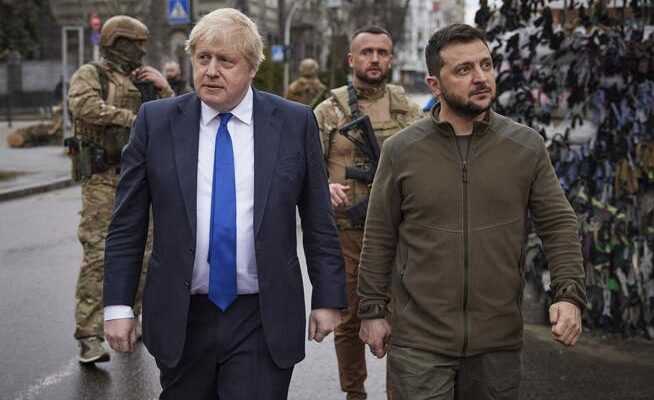The British supplied the Ukrainians with weapons early on, and their secret services are leaders in information warfare. Prime Minister Johnson likes to play the role of the hawk – and is politically much more firmly in the saddle again.
Boris Johnson walks in Kyiv alongside Volodymyr Zelensky.
Boris Johnson is a man of grand gestures and symbolic appearances. The British Prime Minister was therefore in his element when he arrived in Kyiv at the weekend for a surprise visit to see Volodymyr Zelensky. The heads of government of Poland, the Czech Republic and Slovenia had already traveled to the Ukrainian capital in mid-March at a far more dangerous time. Selenski recently received the Austrian Chancellor Karl Nehammer and the President of the European Commission Ursula von der Leyen in Kyiv.
But while von der Leyen’s visit was reminiscent of a formal state visit, Johnson walked through Kyiv at Zelenski’s side and was guarded by soldiers. A passerby thanked him profusely for the British support: “Boris, I’m so happy to see you, I love Great Britain,” said the Ukrainian. Johnson insisted on shaking the man’s hand in front of the camera.
Boris Johnson shakes hands with a passerby in Kyiv.
Johnson’s connection to Zelenski
The video of the scene was viewed 1.6 million times online and was grist to Johnson’s mill. Since the outbreak of war, the prime minister and his government have never missed an opportunity to uncompromisingly support Ukraine and rhetorically condemn Russia with all the sharper artillery. In London it is said that the showman Johnson and the former actor Zelensky have a good relationship – which Johnson uses to present himself as Ukraine’s most loyal ally.
In return, Selenski recently praised Johnson in one Interview with The Economist, in which he criticized other Western states who urged Ukraine to sign a ceasefire: “Britain is clearly on our side and is not performing a balancing act. Britain is not looking for ways out. Britain wants Ukraine to win and Russia to lose.”
Ukrainians thank Queen for rockets
This attitude is shared across party lines and is well received by the population. the Conservative MP Alicia Kearns gives several reasons for this: The experience of the poison gas attack on the former spy Sergei Skripal in Salisbury in 2018 still has an effect today. In addition, the British were also guided by a sense of fairness in their reaction to the Russian war of aggression. “The British don’t want Ukraine to be divided,” says the foreign policy expert. “We’d rather arm the Ukrainians to the teeth than grant Putin any success.”
In fact, Britain was sending more arms to Ukraine and began deliveries much earlier than most NATO countries. The NLAW anti-tank missiles, which can easily be carried on the shoulder, are particularly popular. According to media reports, Ukrainian soldiers sang “God save the Queen” when they shot down Russian tanks with the projectiles. In Kyiv, Johnson promised, among other things, the delivery of anti-ship missiles that the Ukrainians would use to fend off attacks from the Black Sea.
Intelligence agencies on the offensive
Great Britain also plays a decisive role in the information war between the West and Russia. The Department of Defense releases daily updates in which military intelligence summarizes the situation. The foreign intelligence service MI-6 and the technological intelligence service GCHQ, which have abandoned their traditional secrecy, have also gone on the offensive.
We knew Putin’s invasion plans included summary executions by his military and intelligence services. The reports of execution-style killings of civilians emerging from liberated areas are horrifying and chilling. https://t.co/Yea1Lhsqe6
— Richard Moore (@ChiefMI6) April 3, 2022
Already in autumn the British services warned of an invasion. Since the outbreak of the war, spies have been bombarding the media with assessments of the situation. MI-6 chief Richard Moore recently let the world know on Twitter that the Russian invasion plans had included summary executions of civilians from the start. Jeremy Flemming, the Director of GCHQ, justified the new openness of the secret services in a recent lecture with the need to counter Russian propaganda. Release of classified information is crucial to ensure the truth is heard.
Stingy refugee program
Last but not least, Boris Johnson likes the role of the hawk, outstripping his counterparts in Paris or Berlin with the call for stricter sanctions – which he finds easier because Great Britain is far less dependent on Russian energy imports than many EU countries. On the other hand, the UK lagged behind the EU when it came to sanctions against oligarchs. And only the implementation of the new laws will show whether the government really drains the “Londongrad” swamp.
Finally, the stingy program to take in war refugees does not fit well with Johnson’s rhetoric. According to surveys, the British would be very willing to help, but only those who have previously received a visa can enter the United Kingdom. The procedure is so formalistic that that by the end of last week only 1200 Ukrainians had arrived. In total, however, almost 44,000 visa applications have been received from refugees who have family members or other supporters in Great Britain.
However, this does little to cloud the image of Boris Johnson as the Ukrainians’ most loyal ally. Johnson, who had serious fears about losing his position a few weeks ago, suddenly seems to be in the saddle again, especially since the war is making the affair surrounding lockdown parties appear to be of secondary importance. Critics within the party are also suddenly praising the prime minister’s crisis management: According to a member of parliament, the Ukraine war could give the conservatives a boost in the local elections in May, because Johnson is doing a good job.
